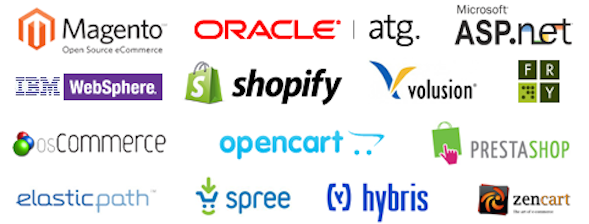The proliferation of online commerce has necessitated a strategic approach to selecting appropriate ecommerce frameworks. This paper presents a comprehensive comparative analysis of leading platforms, including Magento (Adobe Commerce), Shopify, WooCommerce, BigCommerce, Salesforce Commerce Cloud, and Sylius, focusing on their respective use cases, features, and limitations. By examining critical factors such as scalability, customization, cost, integration capabilities, and community support, this study aims to provide businesses with actionable insights for informed decision-making. Furthermore, the paper offers strategic recommendations tailored to various business sizes and complexities, emphasizing the importance of aligning platform selection with specific organizational goals.
Navigating the Digital Marketplace: A Comparative Analysis of Ecommerce Frameworks and Strategic Selection
Abstract:
The proliferation of online commerce has necessitated a strategic approach to selecting appropriate ecommerce frameworks. This paper presents a comprehensive comparative analysis of leading platforms, including Magento (Adobe Commerce), Shopify, WooCommerce, BigCommerce, Salesforce Commerce Cloud, and Sylius, focusing on their respective use cases, features, and limitations. By examining critical factors such as scalability, customization, cost, integration capabilities, and community support, this study aims to provide businesses with actionable insights for informed decision-making. Furthermore, the paper offers strategic recommendations tailored to various business sizes and complexities, emphasizing the importance of aligning platform selection with specific organizational goals.
1. Introduction:
The digital marketplace has become a pivotal arena for businesses seeking growth and sustainability. The selection of an appropriate ecommerce framework is paramount to establishing a robust online presence. This paper seeks to provide a structured analysis of prominent ecommerce platforms, offering a comparative evaluation of their functionalities and suitability for diverse business models. By delineating the strengths and weaknesses of each framework, this study intends to guide businesses in making informed strategic decisions.
2. Methodology:
This paper employs a qualitative comparative analysis, drawing upon industry reports, case studies, and vendor documentation. Each platform is assessed based on the following criteria:
- Scalability: Ability to handle increasing traffic and transaction volumes.
- Customization: Flexibility in tailoring the platform to specific business needs.
- Cost: Total cost of ownership, including upfront costs, transaction fees, and maintenance.
- Integration: Compatibility with existing enterprise systems (ERP, CRM, etc.).
- Support and Community: Availability of customer support and developer resources.
3. Comparative Analysis of Ecommerce Frameworks:
3.1. Magento (Adobe Commerce):
- Use Case: Large enterprises, complex B2B and B2C operations.
- Features: Advanced analytics, AI-driven personalization, extensive customization.
- Strengths: High scalability, robust feature set, strong developer community.
- Limitations: High development and maintenance costs, steep learning curve.
- Industry Relevance: Fashion, automotive, large-scale retail.
3.2. Shopify:
- Use Case: Small to medium-sized businesses, rapid deployment.
- Features: User-friendly interface, extensive app marketplace, integrated payment processing.
- Strengths: Ease of use, quick setup, robust ecosystem.
- Limitations: Limited customization without third-party apps, transaction fees on non-Shopify Payments.
- Industry Relevance: Retail, consumer goods, startups.
3.3. WooCommerce:
- Use Case: WordPress users, cost-effective solutions.
- Features: Open-source flexibility, extensive plugin library, SEO-friendly.
- Strengths: Cost-effective, high customization, strong community support.
- Limitations: Requires WordPress expertise, potential scalability issues.
- Industry Relevance: Niche markets, bloggers, small businesses.
3.4. BigCommerce:
- Use Case: Growing businesses, scalability without technical overhead.
- Features: Built-in SEO, multi-channel selling, robust analytics.
- Strengths: Scalability, no transaction fees, strong multi-channel integration.
- Limitations: Limited design flexibility compared to open-source platforms.
- Industry Relevance: Apparel, electronics, home goods.
3.5. Salesforce Commerce Cloud:
- Use Case: Large enterprises, integrated CRM and ecommerce solutions.
- Features: AI-driven personalization, customer data platform, seamless CRM integration.
- Strengths: Powerful AI and data analytics, strong CRM integration.
- Limitations: High cost, complex implementation.
- Industry Relevance: Financial services, healthcare, large-scale retail.
3.6. Sylius:
- Use Case: Custom solutions, API-driven development.
- Features: Open-source, headless architecture, Symfony-based.
- Strengths: High flexibility, developer-friendly, API-first approach.
- Limitations: Requires significant development effort, smaller community compared to others.
- Industry Relevance: B2B marketplaces, custom solutions, luxury goods.
4. Strategic Recommendations:
- Startups and Small Businesses: Prioritize ease of use and rapid deployment. Shopify and WooCommerce offer cost-effective solutions with minimal technical overhead.
- Mid-Sized Businesses: Focus on scalability and feature richness. BigCommerce provides a balance of functionality and ease of management.
- Large Enterprises: Emphasize customization, integration, and advanced analytics. Magento and Salesforce Commerce Cloud offer robust solutions for complex operations.
- Custom Solutions: Leverage the flexibility of Sylius for unique business requirements and API-driven development.
5. Conclusion:
The selection of an appropriate ecommerce framework is a strategic imperative that requires careful consideration of business goals, technical capabilities, and budgetary constraints. This comparative analysis highlights the diverse strengths and limitations of leading platforms, enabling businesses to make informed decisions. Aligning platform selection with specific organizational needs is crucial for establishing a successful and sustainable online presence. Future research should explore the impact of emerging technologies, such as AI and blockchain, on the evolution of ecommerce frameworks.
References:
- Adobe Magento Commerce. (n.d.). Retrieved from [Adobe Magento Official Website].
- Shopify. (n.d.). Retrieved from [Shopify Official Website].
- WooCommerce. (n.d.). Retrieved from [WooCommerce Official Website].
- BigCommerce. (n.d.). Retrieved from [BigCommerce Official Website].
- Salesforce Commerce Cloud. (n.d.). Retrieved from [Salesforce Commerce Cloud Official Website].
- Sylius. (n.d.). Retrieved from [Sylius Official Website].
- Industry reports and case studies from relevant ecommerce publications.
This paper is designed to be a professional document for publication and can be modified to fit the specific needs of a journal or conference.
